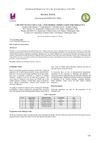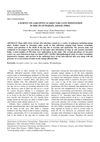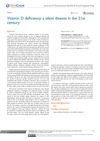 August 2020 in “International journal of research in ayurveda and pharmacy”
August 2020 in “International journal of research in ayurveda and pharmacy” Maltadya Tail might be a good, affordable, and easy-to-use treatment for hair loss.
 January 2018 in “Elsevier eBooks”
January 2018 in “Elsevier eBooks” The document concludes that alopecia has significant social and psychological effects, leading to a market for hair loss treatments.
[object Object]  August 2007 in “Journal of Investigative Dermatology”
August 2007 in “Journal of Investigative Dermatology” The meeting discussed vitamin D3's role in fighting tuberculosis, potential treatments for skin conditions like psoriasis, and hair follicle regeneration as a possible solution for hair loss.
 July 1988 in “Journal of The American Academy of Dermatology”
July 1988 in “Journal of The American Academy of Dermatology” Various dermatologic treatments were effective for skin conditions like acne, rosacea, hair loss, and psoriasis from December 1986 to December 1987.
 13 citations,
December 2020 in “Dermatologic Therapy”
13 citations,
December 2020 in “Dermatologic Therapy” Sebaceous glands in our skin, developing during pregnancy and active in puberty, produce sebum for skin lubrication, temperature control, and fighting germs, also help in hormone regulation, and their dysfunction can cause conditions like acne and hair loss.
 April 2021 in “Journal of Investigative Dermatology”
April 2021 in “Journal of Investigative Dermatology” IL-15 helps protect hair follicles from immune attacks and encourages hair growth.
 24 citations,
January 2008 in “KARGER eBooks”
24 citations,
January 2008 in “KARGER eBooks” The document concludes that ongoing research using animal models is crucial for better understanding and treating Alopecia Areata.
 6 citations,
February 2022 in “Journal of immunology research”
6 citations,
February 2022 in “Journal of immunology research” Exosomes from fat-derived stem cells can potentially improve hair growth and could be a new treatment for immune-related hair loss.
11 citations,
January 2011 in “American journal of transplantation” Some patients developed hair loss after islet cell transplant possibly due to their immune-suppressing medications.
[object Object]  191 citations,
May 2018 in “British journal of dermatology/British journal of dermatology, Supplement”
191 citations,
May 2018 in “British journal of dermatology/British journal of dermatology, Supplement” Alopecia areata is likely an autoimmune disease with unclear triggers, involving various immune cells and molecules, and currently has no cure.
 January 2023 in “Advances in reproductive sciences”
January 2023 in “Advances in reproductive sciences” Higher levels of the protein Pannexin-1 may play a role in hair loss in women with PCOS.
 150 citations,
October 2010 in “The American Journal of Pathology”
150 citations,
October 2010 in “The American Journal of Pathology” The document concludes that more research is needed to better understand and treat primary cicatricial alopecias, and suggests a possible reclassification based on molecular pathways.
110 citations,
December 2013 in “The journal of investigative dermatology. Symposium proceedings/The Journal of investigative dermatology symposium proceedings” Alopecia areata is a genetic and immune-related hair loss condition that is often associated with other autoimmune diseases and does not typically cause permanent damage to hair follicles.
61 citations,
September 2010 in “Journal of Dermatological Science” Stress hormones and autoimmune reactions can cause hair loss.
 42 citations,
January 1998 in “BioDrugs”
42 citations,
January 1998 in “BioDrugs” Azathioprine's effectiveness and safety require careful monitoring and more research, especially regarding its use with corticosteroids and the role of TPMT status in patients.
 33 citations,
September 2017 in “Journal of clinical immunology”
33 citations,
September 2017 in “Journal of clinical immunology” New treatments for immune disorders caused by FOXN1 deficiency are promising.
 29 citations,
June 2018 in “Scientific Reports”
29 citations,
June 2018 in “Scientific Reports” 15-lipoxygenase helps keep skin healthy by reducing inflammation.
 12 citations,
June 2005 in “Journal of the European Academy of Dermatology and Venereology”
12 citations,
June 2005 in “Journal of the European Academy of Dermatology and Venereology” A man with HIV developed skin and hair issues after starting HIV treatment, which improved with topical treatment.
 4 citations,
October 2022 in “Genes”
4 citations,
October 2022 in “Genes” Our microbiome may affect the development of the hair loss condition Alopecia Areata, but more research is needed to understand this relationship.
 3 citations,
February 2022 in “Rheumatology”
3 citations,
February 2022 in “Rheumatology” Baricitinib was effective in treating a patient with dermatomyositis and hair loss.
 1 citations,
January 2024 in “Nature communications”
1 citations,
January 2024 in “Nature communications” Activating TLR5 in the gut can extend lifespan and improve health in aged mice.
 April 2024 in “Exploratory Animal and Medical Research”
April 2024 in “Exploratory Animal and Medical Research” Sarcoptes mites cause severe skin issues in dogs, which can be fatal if untreated.
 September 2022 in “Farmacja Polska”
September 2022 in “Farmacja Polska” Biotin is important for health, but taking extra usually doesn't help unless you're deficient.
 January 2020 in “Archives of Medicine and Health Sciences”
January 2020 in “Archives of Medicine and Health Sciences” Certain immune molecules and stress affect hair loss, and while genes play a role, more research is needed to fully understand and treat it.
 April 2018 in “Assiut Veterinary Medical Journal/Maǧallaẗ Asyūṭ al-ṭibiyyaẗ al-baytariyyaẗ”
April 2018 in “Assiut Veterinary Medical Journal/Maǧallaẗ Asyūṭ al-ṭibiyyaẗ al-baytariyyaẗ” Zinc levels in body fluids can help diagnose zinc deficiency in lambs, with fecal zinc as an early indicator.
 April 2017 in “Journal of nutritional health & food engineering”
April 2017 in “Journal of nutritional health & food engineering” Over 65% of people in the United Arab Emirates have undetected vitamin D deficiency, causing symptoms often mistaken for stress or migraines.
 December 2013 in “The journal of investigative dermatology. Symposium proceedings/The Journal of investigative dermatology symposium proceedings”
December 2013 in “The journal of investigative dermatology. Symposium proceedings/The Journal of investigative dermatology symposium proceedings” New research is helping develop better treatments for alopecia areata.

Some supplements may help reduce side effects of cancer treatments in pets.
November 2022 in “Journal of the Endocrine Society” Correcting vitamin D and progesterone deficiencies can significantly improve hair loss, acne, and BPH symptoms.
 1250 citations,
August 2021 in “Scientific Reports”
1250 citations,
August 2021 in “Scientific Reports” COVID-19 leaves 80% of patients with long-term symptoms like fatigue and headaches.


























